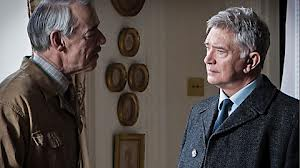Originally published by L.S. Media. September 2nd 2012.
L.S. Media ****
Cast: Martin Shaw, Lee Ingleby, Roger Lloyd-Pack, Christopher Fairbanks, Geraldine Somerville, Ebony Buckle, James Norton, Simon Hubbard, Don Gallagher, Chris Brailsford, Nick Hendrix, Nicholas Lumley, Fred Pearson, Alex Childs, Beverly Fox.
Like Inspector Morse before it, it is the charm of the actors and the spark between two policeman that makes Inspector George Gently worthwhile and cracking television vision.
Not afraid to tackle certain subjects as inherent racism felt by particular section of the British public in the late 1960’s, the second episode of the latest series sees Martin Shaw’s Inspector Gently investigate the death of a young woman left to drown after the car she had been travelling in had been involved in an accident.
With shades of the Chappaquiddick incident in which Senator Edward Kennedy was famously involved in 1969, the story soon becomes one of class struggle and morality. To do the right thing is a constant theme in which Lee Ingleby as the Detective Inspector’s right hand man, (although they don’t work the same church of thought, let alone the same hymn book) is hell bent on destroying a man’s life on the pretext of his prejudice and dislike against a very dysfunctional family.
The success of the Inspector George Gently programme relies heavily on the spark between the two main actors, it seems to be a feature of police dramas that as single investigator such as Detective Frost is all well and good but it doesn’t have the gravitas, the pull for the viewer as two. For every Morse there must be a Lewis or in this case, for every George Gently there has to be a John Bacchus, old school and indefatigable against the new breed of policemen who are frustrated with the old ways of detective work, the odd slip of evidence that never really hurt anyone.
In one of the truths of British police drama, no matter who has done the wrong, the idea of framing anybody for that crime, no matter how hard the suspicions, is wrong. The end never justifies the means and it is a lesson that Lee Inglyby’s character of John Bacchus resents.
The cast is completed by two old stagers of British television, notably Roger Lloyd Pack and Christopher Fairbanks. Between them, these two men have notched up appearances in some of the finest dramas this country has produced. To see them together on screen was a joy and one that audiences might never see again. The real gem in the programme was the emergence of Ebony Buckle. Not only was she a first rate addition to the cast but the scene in which she is singing and playing fiddle in the miners club in Northumberland was just a class move by the producers of the programme.
It might be the idea of restorative justice without having to resort to the cold functional world of technology that makes the programme so appealing and easy on the eye for Sunday night viewing. Whatever the reason, it does the job and provides a good story for viewers.
Ian D. Hall

